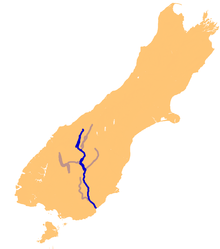Clutha River

The Clutha River or the Mata-Au River is the second longest river in New Zealand and the longest in the South Island. It flows over 338 kilometers from Lake Wānaka in the Southern Alps to the Pacific Ocean, southwest of Dunedin. It has the highest volume and is the fastest river in New Zealand.[1] The river is known for its beautiful scenery, gold-rush history, and fast turquoise waters. There's an effort by a group called the Clutha Mata-Au River Parkway Group to create a regional river parkway along the entire river.[2][3]
The river starts at the head of the Makarora River, near Haast Pass, flowing into the northern end of Lake Wānaka. The lake's southern end connects to the Clutha near Albert Town, where it meets its first main tributary, the Hāwea River. Further downstream, it's fed by the Cardrona River. As the river travels through the Upper Clutha Valley, it encounters ancient glacial terraces, including a section called the 'Snake.' Near Luggate, there's a unique feature called the "Devil's Nook," and the river narrows at the Māori Gorge in Queensberry.[4]
Names
[change | change source]
The river is called Mata-au in Māori, which means current or eddy in a large expanse of water. It was a significant route for Māori people, offering direct access from the coast through Central Otago to lakes Wānaka, Hāwea, and Whakatipu Waimāori.[5]
Its official name is Clutha River / Mata-au since 1998, following the Ngāi Tahu Claims Settlement Act.[6] This landmark settlement recognized the equal importance of both English and Māori names for about 90 geographic features in the South Island.[7][8]
In New Zealand's early colonial history, it was officially called the Molyneux from below the junction with the Kawarau River at Cromwell, a name given by Captain Cook.[9]
References
[change | change source]- ↑ "CLUTHA RIVER". Encyclopaedia of New Zealand. 1966. Retrieved 25 December 2023.
- ↑ "State of New Zealand's Environment 1997 - Chapter 7: Nature of NZ's water environment [Ministry for the Environment]". web.archive.org. 2005-04-16. Archived from the original on 2005-04-16. Retrieved 2023-12-25.
- ↑ "Clutha River/Mata-Au | Flow & Gold Mining | Britannica". www.britannica.com. Retrieved 2023-12-25.
- ↑ Farminer, Andrea Susan (2013). "People, Rivers and Recreation: Fluid Relationships of Place and Experience on the Clutha River, Otago, New Zealand" (PDF). ourarchive.otago.ac.nz. Archived from the original (PDF) on 2022-10-06. Retrieved 2023-12-25.
- ↑ Reed, A. W. (1975). Place names of New Zealand. Wellington: A. H. & A. W. Reed. ISBN 0-589-00933-8.
- ↑ "Ngai Tahu Claims Settlement Act 1998 (1998 No 97)". www.nzlii.org. Retrieved 2023-12-25.
- ↑ "NZGB Gazetteer | linz.govt.nz". gazetteer.linz.govt.nz. Retrieved 2023-12-25.
- ↑ "Place names of New Zealand | Toitū Te Whenua - Land Information New Zealand". www.linz.govt.nz. Retrieved 2023-12-25.
- ↑ Otago Witness, 20.3.1923
